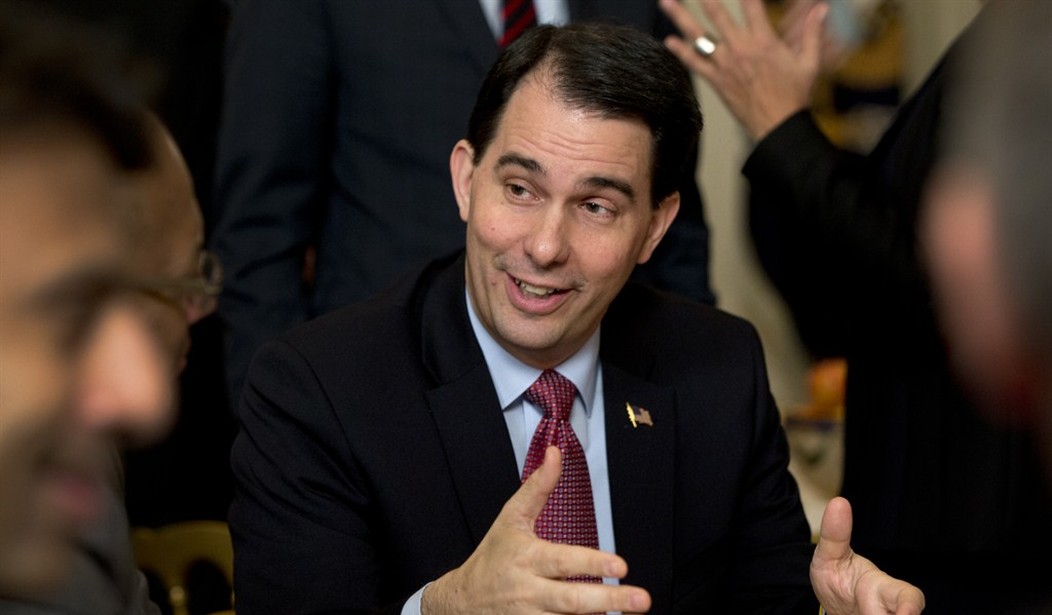In the last two months, Wisconsin Governor Scott Walker has gone from marginal to mainstream, failed to fascinating in the eyes of prospective voters, and inconsequential to intriguing to the ears and mouths of talking heads looking for another Republican Presidential contender to dissect then disintegrate.
Critics are faulting him for his non-answers to dubious questions from reporters. They also quibble about his lack of foreign policy experience and long-term immigration strategy. Liberal and conservative partisans still hanker for some right-wing version of President Obama, full of hope and change, charisma in place of principle.
Before judging Walker's skills as a media jouster, or executive disciplinarian, voters should hear his testimony in federal Congressional hearings. President Obama's diffident lack of rapport with Congress is one of his greatest liabilities, culminating in illegal, extrajudicial, and unconstitutional executive actions contrary to both the spirit and the letter of the law. Presidents execute law, and voters should start paying attention to how the next US President respects and responds to Congress.
While many Walker fans know his triumph over public sector unions, they may not know that he defended his actions, and the municipal pension reforms which followed, to the House Oversight Committee, which conducted hearings on State and Municipal Government Debt.
Oversight Hearings are rife with political posturing, and Democratic members sought every opportunity to downplay then demonize Walker and his Act 10 collective bargaining reforms. Nevertheless, Walker took the attacks in stride, and demurred from petty squabbles to establish sincere arguments based on clear results.
Iowa Congressman (and failed 2014 US Senate candidate) Bruce Braley tried to define public workers as the victims of Walker's Act 10 reforms. Launching into a self-serving tirade about his own tenure as a public worker, Braley tried to squeeze Walker about his 2010 campaign "secret donors." Walker balked in due fashion: "I though the purpose of today was to talk about debt." Braley kept trying to shame Walker about his campaign, but the governor brought the discussion back to fighting debt through reforms. Eventually Walker called Braley out: "If you want to do a political stunt, go ahead." Inadvertently, the wandering Iowa Congressman complimented the Wisconsin Governor: "I think it's time we got some straight answers from people who are radically reforming state governments."
Recommended
Braley labeled Walker a radical reformer? Bam!
Congressman Chris Murphy of Connecticut, later an Oak State US Senator in 2012, tried to paint Walker as anti-labor and anti-family. He attempted to tease out Wisconsin Republican plans to break unions' "bullying power" as a political force and stop President Obama's reelection in 2012. Ironically enough, Murphy uploaded his questioning precisely to promote his Senate run. Murphy wanted to talk about the Koch Brothers. Walker talked about his reforms:
There's a lot of money coming from all kinds of sources. . . .I can't answer for Scott Fitzgerald [Wisconsin senate majority leader] but I can answer for Scott Walker. For me, it's about the budget. It's also about making government work better. When I talk about the middle class, it's not just about the paying middle class. It's about middle class individuals who work for state and local governments.
Walker explained that either the state pursued collective bargaining reforms to cut costs, or issue massive layoffs, which other states had to do. About education reforms, Walker offered: "I'd like to have a system like we do elsewhere in society where we pay people based on performance, not just reward people based on seniority."
Murphy wanted to frame Walker as anti-Middle Class, but Walker punched back, protecting middle class workers, both public and private. "It's all about balancing the budget now and for the future." Looking forward and in the present, Walker ably defended his reforms.
Progressive Democrat Dennis Kucinich, who lost a bitter primary fight in 2012, pressed Walker on the real purpose behind his Act 10 reforms. Refusing to let the governor answer the question, he fired up the diminishing number of progressive partisans, but impressed few others. Kucinich first related that state unions had agreed to funding concessions, but grilled Walker to explain the reforms.
You refused to drop your demand to strip workers of the collective bargaining rights. It had nothing to do with the budget. . .I don't understand how repealing collective bargaining rights for public workers shows us anything about state debt.
Walker answered:
That and a number of provisions we put in because we wanted to make sure that we protected the workers of our state so that they could know what kind of value that they got out of it. We gave workers the right to choose. It's a fundamental American right, whether a worker wants to be a part of a union.
Workers receive paycheck protections, too, and the savings would shore up the long-term pension and benefits liabilities for the state. Walker acknowledged that the reforms did not create savings automatically, yet this discussion ran contrary to the Democratic narrative that Walker was an anti-union bully trying to protect The Rich. Of course, no one would ever know, since Kucinich refused to let Walker answer the questions.
Never running away from a tough interrogations, yet refusing to be pushed around by posturing Democratic politicians looking to maintain their ties to Big Labor’s unjust funding streams, Wisconsin Governor Scott Walker impressed upon Congress that he took their concerns seriously, saw through their ulterior motives, and never backed away from explaining then defending the Act 10 collective bargaining reforms which took Wisconsin from the red to the black.
If Walker as a newly-elected Governor could stand up to liberal partisans with deft answers and adept poise, imagine what President Walker would do when negotiating with both chambers of Congress on more necessary entitlement, budget, and discretionary funding reforms in the future.

























Join the conversation as a VIP Member